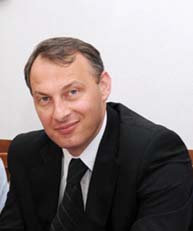Georgia “partially” welcomes Shamba’s statement
By Temuri Kiguradze
Wednesday, August 19

Speaking on the Abkhazian administrative border on August 17 Baramia appealed to ethnic Abkhazians to conduct dialogue. “Today as never before there is a need for consolidation and mutual effort. Dear compatriots, I call on you to hold bilateral dialogue. We should not destroy the bridges which unite our nations,” Baramia said through a powerful sound system turned in the direction of the Georgian breakaway region. His appeal was heard in de facto Abkhazian capital Sokhumi, where Sergey Shamba stated that the Abkhazian side “fully agrees” with the part of the speech about restoring the ties between the Georgian and Abkhaz people. “Every man with common sense should wish for the same,” stated Shamba. However he condemned “other parts” of Baramia’s statement, specifically those blaming Russia for starting the conflicts in Georgia.
Shamba said that it’s impossible to restore relations between the Abkhaz and Georgian peoples until Georgian policy is changed. “It’s unreal even to speak about reuniting and restoring the territorial integrity [of Georgia]. While there are dreams about doing this in Georgia it will be impossible to restore trust. It’s also wrong to blame a third party – Russia. What kind of connection does Russia have with Georgian tanks entering Abkhazia and killing Abkhazians?” stated Shamba, as quoted by Russian and Georgian media outlets.
Baramia in turn welcomed “the position of Shamba” concerning the restoration of trust between Georgians and Abkhazians but urged the de facto Foreign Minister to be “more constructive” when speaking about unity. “As a historian, Shamba should know about the participation of Russian special services in the formation of separatist political parties in Abkhazia in the 1990s. The goal of those parties was to start ethnic confrontation between Georgians and Abkhazians,” stated Baramia. The Chair of the Abkhazian Government-in-Exile also underlined that Russian forces had occupied Abkhazia and built up their military presence in the region. “The Abkhazian people have already begun their confrontation with Russian occupiers. Human rights violations have increased and the Abkhaz people have already seen that they can expect to be eliminated rather than saved by Russia,” he concluded, reminding Shamba that Georgia has once again proposed to the Abkhazian de facto Government that it conduct direct dialogue with Tbilisi without the participation of the Russians.
“Direct dialogue between the Abkhazian and Georgian sides is unavoidable,” says Georgian conflict analyst Malkhaz Chemia. Speaking to The Messenger on August 18, he said this direct dialogue will come about not only through the will of the Abkhazians and Georgians but “the economic needs of the region.”
“Look at the example of the EU. Economic need made French and German businessmen create a union which became the basis for the EU just a few years after the bloodshed of World War II. I think the same will happen in our region as well,” stated Chemia. He also noted that recent developments in internal Abkhazian politics show that more and more people understand that their nation is in danger of extinction under Russian rule. “A lot of Abkhazian nationalists already understand that dependency on Russia will result in nothing but the assimilation of the Abkhazian ethnos into the Russian one and the only chance they have to survive is to integrate with Georgia,” noted Chemia on August 18.
